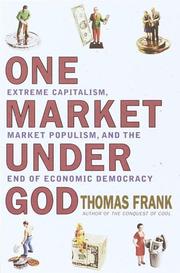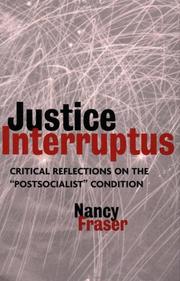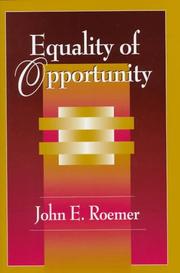| Listing 1 - 8 of 8 |
Sort by
|

ISBN: 038549503X Year: 2000 Publisher: New York Doubleday
Abstract | Keywords | Export | Availability | Bookmark
 Loading...
Loading...Choose an application
- Reference Manager
- EndNote
- RefWorks (Direct export to RefWorks)
Economic order --- United States --- capitalisme --- politique economique --- kapitalisme --- economisch beleid --- Capitalism. --- Distributive justice. --- Kitsch. --- Marketing. --- Populism. --- Capitalism --- Distributive justice --- Kitsch --- Marketing --- Populism --- Consumer goods --- Domestic marketing --- Retail marketing --- Retail trade --- Market economy --- Political science --- Industrial management --- Aftermarkets --- Selling --- Aesthetics --- Distribution (Economic theory) --- Justice --- Social justice --- Wealth --- Economics --- Profit --- Capital --- Moral and ethical aspects --- United States of America

ISBN: 0415917956 0415917948 9780415917957 Year: 1997 Publisher: New York (N.Y.): Routledge,
Abstract | Keywords | Export | Availability | Bookmark
 Loading...
Loading...Choose an application
- Reference Manager
- EndNote
- RefWorks (Direct export to RefWorks)
Justice --- Distributive justice. --- Culture conflict. --- Justice. --- Culture conflict --- Distributive justice --- Injustice --- Conduct of life --- Law --- Common good --- Fairness --- Distribution (Economic theory) --- Social justice --- Wealth --- Cultural conflict --- Culture wars --- Conflict of cultures --- Intercultural conflict --- Social conflict --- Moral and ethical aspects --- Political philosophy. Social philosophy

ISBN: 0674259912 0674004221 0674042875 9780674042872 9780674259911 Year: 1998 Publisher: Cambridge [Mass.]: Harvard university press,
Abstract | Keywords | Export | Availability | Bookmark
 Loading...
Loading...Choose an application
- Reference Manager
- EndNote
- RefWorks (Direct export to RefWorks)
John Roemer points out that there are two views of equality of opportunity that are widely held today. The first, which he calls the nondiscrimination principle, states that in the competition for positions in society, individuals should be judged only on attributes relevant to the performance of the duties of the position in question. Attributes such as race or sex should not be taken into account. The second states that society should do what it can to level the playing field among persons who compete for positions, especially during their formative years, so that all those who have the relevant potential attributes can be considered. Common to both positions is that at some point the principle of equal opportunity holds individuals accountable for achievements of particular objectives, whether they be education, employment, health, or income. Roemer argues that there is consequently a "before" and an "after" in the notion of equality of opportunity: before the competition starts, opportunities must be equalized, by social intervention if need be; but after it begins, individuals are on their own. The different views of equal opportunity should be judged according to where they place the starting gate which separates "before" from "after." Roemer works out in a precise way how to determine the location of the starting gate in the different views.
Economic policy and planning (general) --- Income --- Welfare economics --- Distributive justice --- Equality --- Competition --- Social policy --- Mathematical models --- Mathematical models. --- National planning --- State planning --- Economic policy --- Family policy --- Social history --- Egalitarianism --- Inequality --- Social equality --- Social inequality --- Political science --- Sociology --- Democracy --- Liberty --- Distribution (Economic theory) --- Justice --- Social justice --- Wealth --- Moral and ethical aspects --- E-books --- Welfare economics - Mathematical models --- Distributive justice - Mathematical models --- Equality - Mathematical models --- Competition - Mathematical models --- Social policy - Mathematical models

ISBN: 0674029666 9780674029668 0674002180 9780674002180 9780674006935 0674006933 Year: 2001 Volume: 1996 Publisher: Cambridge (Mass.): Harvard university press,
Abstract | Keywords | Export | Availability | Bookmark
 Loading...
Loading...Choose an application
- Reference Manager
- EndNote
- RefWorks (Direct export to RefWorks)
This work presents G.A. Cohen's Gifford Lectures, delivered at the University of Edinburgh in 1996. Focusing on Marxism and Rawlsian liberalism, Cohen draws a connection between these thought systems and the choices that shape a person's life. In the case of Marxism, the relevant life is his own: a communist upbringing in the 1940s in Montreal, which induced a belief in a strongly socialist egalitarian doctrine. The narrative of Cohen's reckoning with that inheritance develops through a series of sophisticated engagements with the central questions of social and political philosophy. In the case of Rawlsian doctrine, Cohen looks to people's lives in general. He argues that egalitarian justice is not only, as Rawlsian liberalism teaches, a matter of rules that define the structure of society, but also a matter of personal attitude and choice. Personal attitude and choice are, moreover, the stuff of which social structure itself is made. Those truths have not informed political philosophy as much as they would, and Cohen's focus on them brings political philosophy closer to moral philosophy, and to the Judeo-Christian ethical tradition, than it has recently been.
Equality. --- Distributive justice. --- Social justice. --- Communism. --- Liberalism. --- Religion and social problems. --- Social action --- Social problems and religion --- Social problems --- Liberal egalitarianism --- Liberty --- Political science --- Social sciences --- Bolshevism --- Communist movements --- Leninism --- Maoism --- Marxism --- Trotskyism --- Collectivism --- Totalitarianism --- Post-communism --- Socialism --- Village communities --- Equality --- Justice --- Distribution (Economic theory) --- Social justice --- Wealth --- Egalitarianism --- Inequality --- Social equality --- Social inequality --- Sociology --- Democracy --- Religious aspects --- Moral and ethical aspects --- Communism --- Distributive justice --- Liberalism --- Religion and social problems --- Egalité (Sociologie) --- Communisme --- Socialisme --- Libéralisme --- Political philosophy. Social philosophy
Multi

ISBN: 9782802765615 Year: 2020 Publisher: Bruxelles Bruylant
Abstract | Keywords | Export | Availability | Bookmark
 Loading...
Loading...Choose an application
- Reference Manager
- EndNote
- RefWorks (Direct export to RefWorks)
History of the law --- Tax law --- Taxation --- Fiscal policy --- Finance, Public --- Progressive taxation --- Equality before the law --- Social justice --- Distributive justice --- Impôt --- Politique fiscale --- Finances publiques --- Impôt progressif --- Égalité devant la loi --- Justice sociale --- Justice distributive --- History --- History. --- Histoire. --- Histoire --- Impôt progressif. --- Égalité devant la loi.
Book
ISBN: 9028936386 9077070729 9789028936386 Year: 2005 Publisher: Kapellen Pelckmans
Abstract | Keywords | Export | Availability | Bookmark
 Loading...
Loading...Choose an application
- Reference Manager
- EndNote
- RefWorks (Direct export to RefWorks)
ethiek --- Political philosophy. Social philosophy --- liberalisme --- globalisering --- politieke filosofie --- mensenrechten --- International law --- International relations --- World politics --- Droit international --- Relations internationales --- Politique mondiale --- Distributive justice --- Liberalism --- Philosophy --- Human rights --- Developing countries --- Aanwinstenlijst november 05 --- 240 Internationale politiek --- 172 --- #SBIB:17H3 --- #SBIB:17H20 --- #SBIB:321H30 --- C8 --- internationale politiek --- internationale verhoudingen --- 172 Sociale ethiek. Sociale moraal. Sociale verantwoordelijkheid --- Sociale ethiek. Sociale moraal. Sociale verantwoordelijkheid --- Politieke wijsbegeerte --- Sociale wijsbegeerte: algemeen --- Hedendaagse politieke en sociale theorieën (vanaf de 19de eeuw): algemeen (incl. utilitarisme, burgerschap) --- Ideologie en politiek --- 327 --- Politiek --- Ethiek --- Internationalisering --- Politicologie --- Rechten van de mens --- Monograph --- Mensenrechten --- Godsdienst --- Sport --- Duurzaamheid --- Filosofie --- Psychologie --- Sociologie --- Man --- Maatschappij --- Film --- Cultuur --- Erfelijkheidsleer --- Stadssamenleving --- Technologie --- Voeding --- Verpleegkunde --- Drank --- Gezondheid --- Volwassene

ISBN: 0275974324 0275974332 9780313074868 0313074860 9780313390807 0313390800 9780275974336 9780275974329 9786612573750 6612573759 1282573756 9781282573758 Year: 2002 Publisher: Westport, Conn. Praeger
Abstract | Keywords | Export | Availability | Bookmark
 Loading...
Loading...Choose an application
- Reference Manager
- EndNote
- RefWorks (Direct export to RefWorks)
Examines the reasons for scarcity of transplantable human organs in the American medical system. We call it lifeboat ethics. When there is not enough of this or that scarce good, who should die that others might survive? Born in the 19th century, when shipwrecks were frequent and lifeboats scarce, it has become a 21st century dilemma. Who should get the last hospital bed, the scarce medical drug, the limited educational doctor, the needed transplantable human heart? Tom Koch considers both lifeboat ethics and its modern application to the distribution of transplantable human organs in the United States. He shows that the scarcity of organs is exacerbated where not created by racial and regional inequalities inherent in the American health care and transplant system. The real question, he concludes, is not "who should die" when there is not enough to go around, but the reasons why scarcity pervades at all.
Social justice --- Transplantation of organs, tissues, etc --- orgaantransplantatie (allocatie van organen, donorschaarste) --- rechtvaardigheid (rechtvaardigheidsprincipe, distributieve rechtvaardigheid) --- Transplantation --- Ethics, Medical --- Transplants --- Cell Transplants --- Grafts --- Organ Grafts --- Organ Transplants --- Tissue Grafts --- Tissue Transplants --- Cell Transplant --- Graft --- Graft, Organ --- Graft, Tissue --- Grafts, Organ --- Grafts, Tissue --- Organ Graft --- Organ Transplant --- Tissue Graft --- Tissue Transplant --- Transplant --- Transplant, Cell --- Transplant, Organ --- Transplant, Tissue --- Transplants, Cell --- Transplants, Organ --- Transplants, Tissue --- Bioprosthesis --- Medical Ethics --- Medicine --- Professionalism --- Bioethics --- Transplantations --- Transplantation Immunology --- Transplantation Conditioning --- Medical transplantation --- Organ transplantation --- Organ transplants --- Organs (Anatomy) --- Surgical transplantation --- Tissue transplantation --- Tissues --- Transplant surgery --- Transplantation surgery --- Surgery --- Preservation of organs, tissues, etc. --- Procurement of organs, tissues, etc. --- Law and legislation --- Moral and ethical aspects --- Social aspects --- transplantation d'organes (greffe d'organes, pénurie d'organes, allocation d'organes) --- justice (principe de justice, justice distributive, justice sociale) --- legislation and jurisprudence --- supply & distribution --- ethics --- Professional ethics. Deontology --- Transplantation of organs, tissues, etc.

ISBN: 9042911425 Year: 2002 Publisher: Leuven Paris Peeters
Abstract | Keywords | Export | Availability | Bookmark
 Loading...
Loading...Choose an application
- Reference Manager
- EndNote
- RefWorks (Direct export to RefWorks)
Sociology of health --- Professional ethics. Deontology --- Human medicine --- Europe --- Ethique médicale --- Medische ethiek --- Medical ethics --- Bioethics. --- Ethics, Medical. --- Ethics, Clinical. --- Ethics, Nursing. --- bio-ethiek (medische, biomedische ethiek, bio-ethische aspecten) --- arts-patiëntrelatie --- experiment, experimenteel onderzoek (mensen) --- gezondheidszorgbeleid (gezondheidszorghervorming, gezondheidszorgsysteem) --- gezondheidseconomie (gezondheidszorgeconomie) --- rechtvaardigheid (rechtvaardigheidsprincipe, distributieve rechtvaardigheid) --- Europa --- 241.63*2 --- -#GBIB:CBMER --- Academic collection --- Biomedical ethics --- Clinical ethics --- Ethics, Medical --- Health care ethics --- Medical care --- Medicine --- Bioethics --- Professional ethics --- Nursing ethics --- Social medicine --- Nursing Ethics --- Ethic, Nursing --- Nursing Ethic --- Nurses --- Nursing --- Clinical Ethics --- Clinical Medicine --- Ethicists --- Ethics Committees, Clinical --- Ethics Consultation --- Medical Ethics --- Professionalism --- Biomedical Ethics --- Health Care Ethics --- Ethics, Biomedical --- Ethics, Health Care --- bioéthique (éthique médicale, biomédicale, aspects bioéthiques) --- relation médecin-patient --- expérimentation sur la personne humaine (chez l'humain) --- politique des soins de santé (réforme des soins de santé, système des soins de santé) --- économie de la santé (économie des soins de santé) --- justice (principe de justice, justice distributive, justice sociale) --- Theologische ethiek: medische ethiek: dokter; verpleegster; ziekenhuis --- Moral and ethical aspects --- ethics --- Europe. --- Northern Europe --- Southern Europe --- Western Europe --- History of medicine --- Medicine and ethics --- 20th century --- European --- Medicine and ethics. --- 20th century. --- European. --- 241.63*2 Theologische ethiek: medische ethiek: dokter; verpleegster; ziekenhuis --- Ethics, Clinical --- Ethics, Nursing --- #GBIB:CBMER
| Listing 1 - 8 of 8 |
Sort by
|

 Search
Search Feedback
Feedback About UniCat
About UniCat  Help
Help News
News